On July 13, U.S. Secretary of State Pompeo reversed a long-standing policy of taking no position on territorial disputes in the South China Sea.
In a long policy memorandum, Pompeo wrote, “We are making clear: Beijing’s claims to offshore resources across most of the South China Sea are completely unlawful, as is its campaign of bullying to control them.”
In the memorandum, the U.S. takes a new position in alignment with the 2016 Permanent Court of Arbitration (PCA) decision in the Hague, which invalidated China’s 9-dash line and upheld the Philippines exclusive economic zone, and by implication, the exclusive economic zones of all other claimant nations abutting the South China Sea, including Vietnam, Indonesia, Malaysia and Brunei.
Six days prior to the announcement, the U.S. Navy sailed two aircraft carriers through the South China Sea, an exercise which it had not done for years. America’s new diplomacy in the South China Sea region is backed up by force.
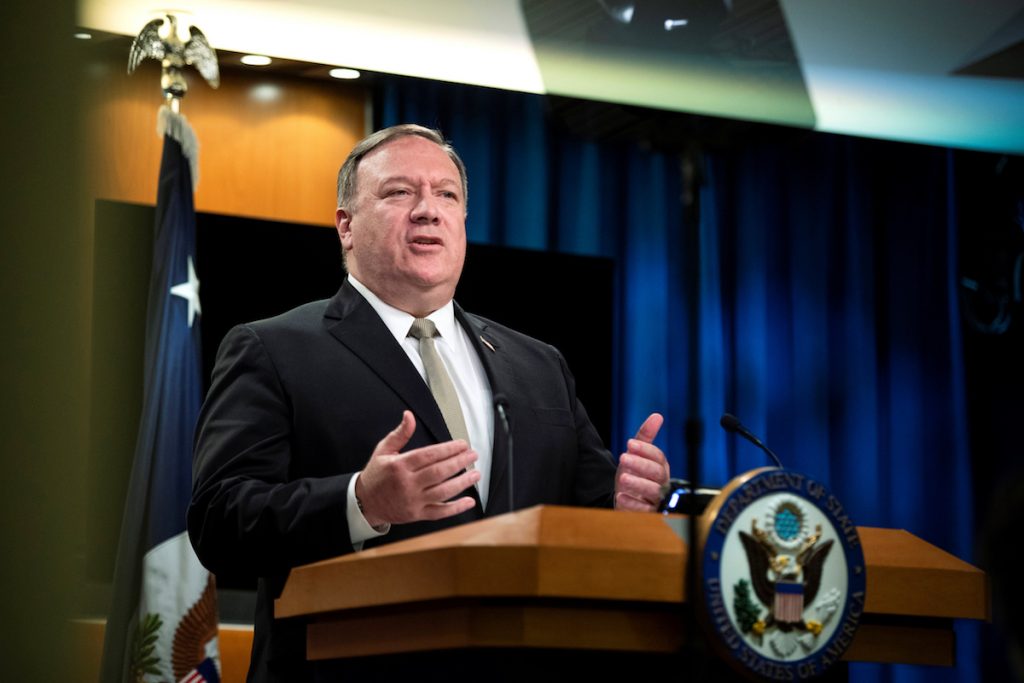
China has been trying to kill international law in the South China Sea. In fact, international law is dead wherever Beijing touches because its communist regime, under General Secretary Xi Jinping who took power in 2013, does not respect anything but the law of force.
We know it has thumbed its nose at international law in the South China Sea since 1982 when it signed the United Nations Convention on the Law of the Sea (UNCLOS) and promptly ignored it in 1988 by killing 64 Vietnamese marines at South Johnson Reef. They were brutally murdered with anti-aircraft guns as they stood waist-deep in water.
In the East China Sea too, China sends fighter jets about once per day, sometimes twice daily, towards Japanese airspace, forcing Japan to scramble fighter jets in response.
China’s history of aggression
Consider India. China’s leaders have refused all offers — five by the British since 1846 and additional offers by the Indian government after 1947 — to demarcate the border. On China’s own northwest territory — which it stole from East Turkistan in 1949 and now calls Xinjiang — its genocide against Uyghurs including forced sterilization of women is a flagrant crime against humanity.
The communist regime has used similar tactics — shocking to the conscience — against its Tibetan, Falun Gong, and Christian citizens. The regime’s crimes include forced organ harvesting against the Falun Gong, as a London tribunal found recently.
Cantonese speakers and lovers of freedom in Hong Kong are worried that any day, now that the Chinese leadership have broken the Sino-British Joint Declaration of 1984, they too could be sent to concentration camps. Since June 2019, over 9,000 democracy protesters have been arrested in Hong Kong.
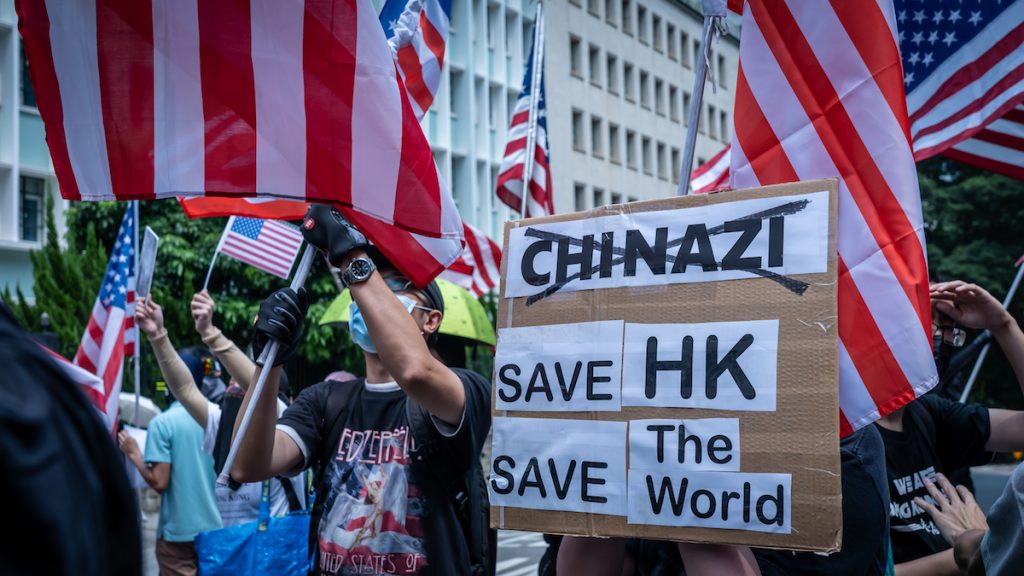
China’s hunger for new territory is seen clearly in the history of the South China Sea. When the Japanese were defeated in 1945, Chinese leadership published its 9-dash line map two years later. They saw a power vacuum in a body of water the size of India and they made their move to claim it all.
Ever since then Beijing has been sensitive to the international environment and when they perceive an opportunity — any opportunity to expand or drop sovereignty markers — they do so, including accompanied by battles against the Vietnamese in 1974 to take the Paracels, resulting in 75 killed, followed by the South Johnson Reef skirmish mentioned above. You can see a video of that skirmish that China itself released in a moment of ill-advised braggadocio.
With the PRC, the global community cannot rely on international law, bilateral treaties, or handshakes. Leaders of the Chinese Communist Party (CCP) use these agreements to buy time until the next opportunity to steal, conquer, and cheat their way into more territory and power.
On the South and East China Sea issues, not only Beijing but Moscow is to blame. Russia has joined China in naval exercises in both the East and South China Seas, and sends its own fighter jets towards Japanese air space. Russia is therefore partially culpable for enabling The Chinese regime’s transgressions in these seas through lending China’s illegal demands the weight of its international military might.
When elephants fight, grass is trampled
The relatively smaller countries of the South China Sea are at risk when these two giants, along with their adversaries, are stampeding through the region. As one diplomat from a claimant country told me years ago, “When the elephants fight, the grass is trampled.”
Vietnam is proud of its defense of its northern territory in the 1979 War, but they lost over 100,000 soldiers compared with about 60,000 soldiers lost by the PRC. At the time China’s population was approximately 19 times that of Vietnam. So, on a per capita basis, Vietnam’s losses were about 32 times as severe as those of China.
To add insult to injury, according to my sources, Vietnam lost a sliver of territory in this war. The loss has been covered up by the Vietnamese government.
India and Indonesia too are proud of their independence. The latter blows up foreign fishing boats that come into its EEZ. But despite the bravery and studied independence of these countries, the reality is that globally, only the United States along with its allies can beat the PRC militarily.
And China is closing that gap very quickly. Soon it will exceed the U.S. in military force. The two U.S. aircraft carriers that sailed the South China Sea last week could have been destroyed by just two nuclear-capable DF-21D “carrier killer” missiles.
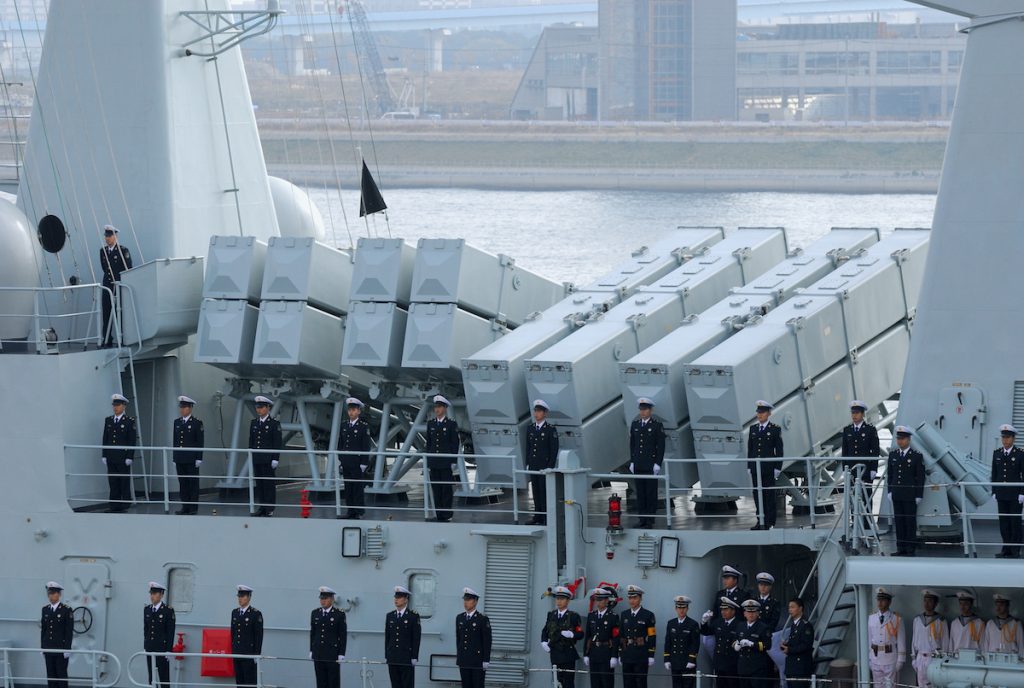
Time is on Beijing’s side
Upon what does China’s tremendous military power rely? Its economy. China’s GDP by purchasing power parity exceeded that of the United States in 2014.
Since 2015, China has had a man-to-man response to U.S. navy ships in the South China Sea. China’s anti-ship missiles outrange U.S. anti-ship missiles. China is building new naval ships at a rate multiple that of U.S. shipyards.
Every American naval surface vessel in the South China Sea is tracked by the Chinese Navy, and China’s ballistic missile forces. China’s carrier killer missiles with hypersonic warheads launched from the mainland mean that every American ship today will have a challenging time staying afloat if attacked by China.
This was untrue just a few years ago and in part explains China’s newfound military confidence.
Time is on the Chinese regime’s side. If China exceeds U.S. military power, the international system, international norms and international laws as we know them will vanish.
Those international laws put into place after 1945 and upon which the world depends for peace and security are defended by American military power, first against the Soviets and now against China.
China’s regime is already working to replace those international laws with their own system that will Sinicize existing international law, which is to say, there would be no international law other than what is decided in the moment by Zhongnanhai in Beijing.
If allowed to continue on its path of militarization and revising the international order, China will reach a tipping point as soon as the next five to ten years after which any resistance to a future of global Chinese hegemony will be impossible.
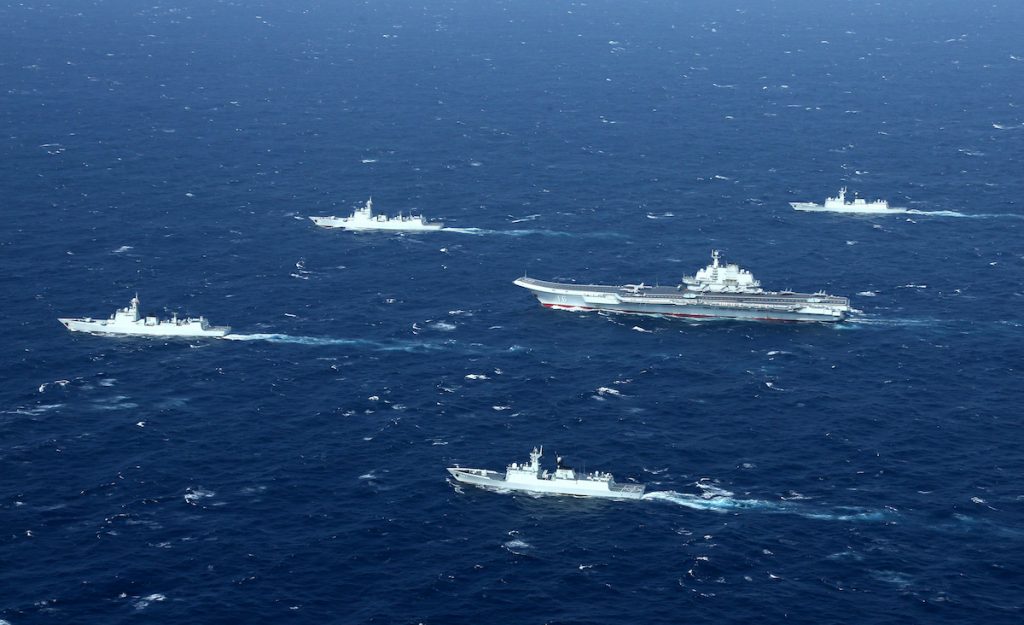
How would the international community be able to stop such a dystopian future that is ever closer to today? Any action to do so would have to be quick and decisive.
Firstly, nations need to decide on removing political and diplomatic influence of the Chinese Communist Party in their societies. For example, more than half of the Vietnamese Communist Party elites are pro-Beijing, according to an expert source. This despite the fact that China frequently sinks Vietnamese fishing vessels and disallows Vietnam from exploiting its offshore mineral resources.
Rodrigo Duterte in the Philippines has turned towards Beijing to the point where its defense alliance with the U.S. is in question. Duterte and his associates, according to my expert sources in the Philippines, are being paid off by Chinese interests through millions of dollars in consulting deals. In a light at the end of the tunnel, the Philippines today also demanded that China follow the 2016 PCA ruling.
Malaysia and Brunei are dependent on China for access to their own EEZs as they have insignificant navies that cannot defend their maritime territory. And, much of the oil and gas they pump is for sale to China among other places. The customer is always right, and the customer is Beijing.
Indonesia has taken a political turn towards China at the secretary level in the past couple of years, and its military modernization is losing steam.
In the United States, the Democratic candidate for president, Joe Biden, is much closer to China on the issues than is Donald Trump. If Biden wins the U.S. election, which he very well may, we can expect fewer and weaker U.S. patrols in the South China Sea as U.S. military budgets are diverted towards social services.
The floodgates of trade with China would reopen under a Biden presidency, which would drown out new U.S. industries that have been given a chance to grow from Director of Trade and Manufacturing Policy Peter Navarro’s tariffs. Unless the U.S. grows a stronger economic and industrial base, the U.S. military will be crippled, and China will expand.
Second, alliances to counter Beijing’s aggression must be strengthened. Vietnam, Malaysia and Brunei have no or weak military alliances. The Association of Southeast Asian Nations (ASEAN) is hogtied by vetos from Laos and Cambodia, two countries that do China’s bidding. ASEAN can’t even agree on tough language against Beijing on the South China Sea much less field an army or float the kind of navy required for defense of their exclusive economic zones (EEZs) against the People’s Liberation Army (PLA).
For this reason and until their economies and militaries mature, South China Sea claimant countries need to rely for defense on an alliance with the United States — the only country capable of defeating China.
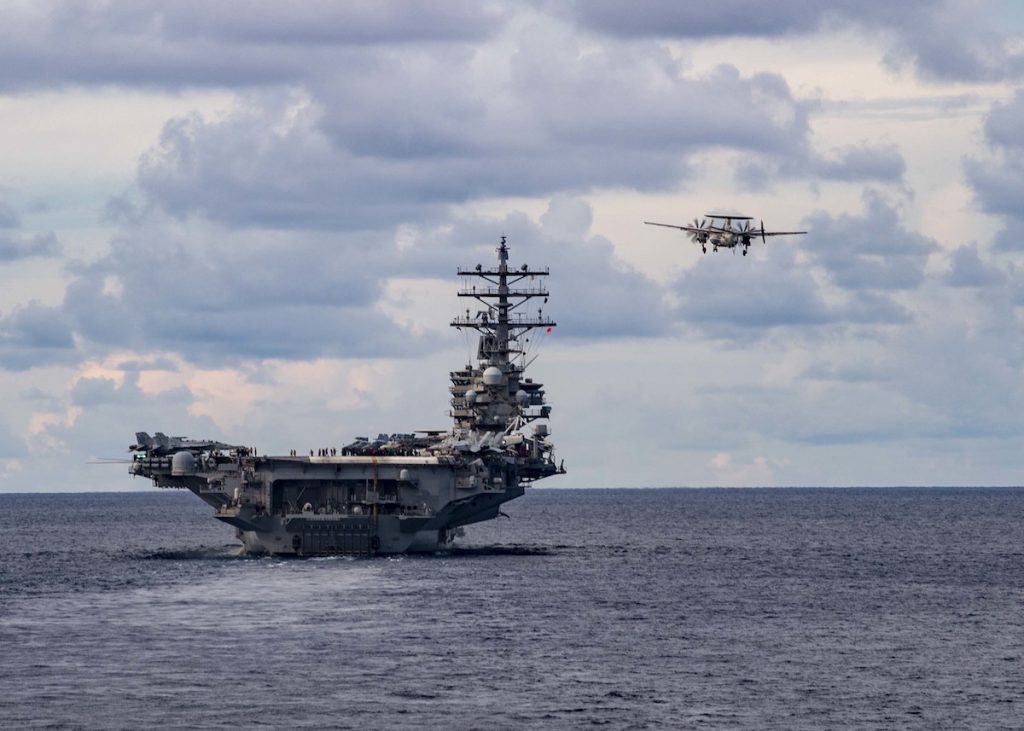
Together with Japan, India, Australia and NATO countries, and a fierce defense of every inch of the maritime commons, the EEZs and borders, concerned nations can contain the Chinese regime’s aggression. “Containment” was a dirty word after the opening to China in 1972, derisively called “Cold War thinking” by PRC propaganda outlets.
But containment is now revealed as the better strategy all along, as the aggressive nature of the Chinese Communist Party becomes ever more apparent from its recent reactions to coronavirus, Hong Kong, India, and the South China Sea.
As one Indian source said today, the U.S. created a Frankenstein in China by trying to use trade to democratize the country. Now Washington must clean up that mess and seek its allies’ assistance.
Third, the concerned international community needs to use its stronger alliances not only militarily, but economically.
It needs to consider increasing economic sanctions on China until Beijing returns to the fold of international law, UNCLOS, honoring its treaties including the Sino-British Joint Declaration of 1984, and the U.N. Universal Declaration of Human Rights of 1948, which China signed, and which absolutely forbids the genocidal atrocities that Beijing is inflicting on its own people.
Oh, and by the way, that declaration also mandates free and fair elections. Beijing has a lot of work to do.
Anders Corr, Ph.D., is editor of Great Powers, Grand Strategies: The New Game in the South China Sea. The views and opinions expressed in this article are those of the author and do not necessarily reflect the official editorial position of LICAS.news.






